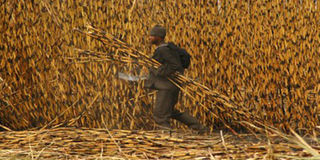State: Project axed to save wildlife

The project was scheduled to include the establishment of a greenfield sugar cane plantation of approximately 7,800 hectares with an additional approximately 3,000 ha by independent sugar cane plantations (outgrowers).
What you need to know:
The project was scheduled to include the establishment of a greenfield sugar cane plantation of approximately 7,800 hectares with an additional approximately 3,000 ha by independent sugar cane plantations (outgrowers).
Dodoma. The Government has decided to shelf the Bagamoyo sugar plantation project in order to safeguard Wami River from which the project would draw its water.
Prime Minister Kassim Majaliwa told Parliament yesterday that the government reached the decision following an advice by a parliamentary committee which he did not name.
He said this in response to a question from Mr Freeman Mbowe, the leader of Official opposition in Parliament and Hai MP on a Chadema ticket during the Prime Minister’s Question Time session.
The project was structured to maximise sugar and power production and production of ethanol.
Against the backdrop of the current sugar crisis in the country, Mr Mbowe wanted to know why the government has dragged its feet on supporting the envisaged Bagamoyo project which would have helped a lot to alleviate perennial sugar shortages in the country.
Premier Majaliwa noted that the decision to shelve the project was taken out of the compelling need to protect the Saadani National Park, which also borders the area where the project was to be implemented.
“We all know that the wildlife in Saadani depends on water from Wami River, and this project was designed to use water from the same river. Obviously, the project would have consumed a lot of water and affected the wellbeing of wildlife in the national park.
“After an advice from a parliamentary committee, we decided that it was better to forgo the project so as to safeguard the national park and its animals,” said Mr Majaliwa.
He further said that the decision was reached after the government noted that there were many other areas where such investments could be carried out without affecting other sectors. On whether the decision by the government to import sugar would affect local production patterns, Mr Majaliwa told Parliament that the amount of sugar which would be imported by the Sugar Board of Tanzania would not affect local producers.
“We expect that production will start in July.
Between now and then, we need about 50,000 tonnes of sugar and we have imported 70,000 tonnes in order to cushion the rising demand during the upcoming Holy month of Ramadan,” he said.




